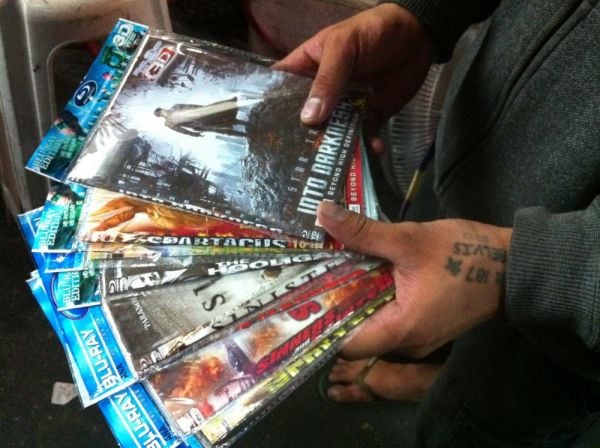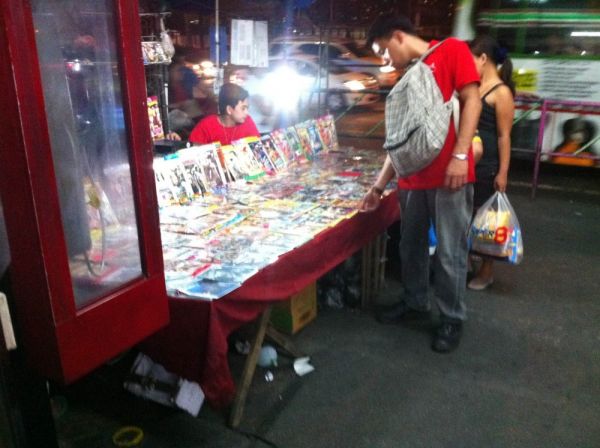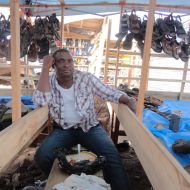The Secret Lives of DVD Bootleggers

Kenneth, a dealer of Manila’s pirated DVDs, showcases his merchandise. Photo credit: Purple Romero
When law-enforcement officials swooped into his tiny shop in the bustling Guadalupe marketplace in Makati City, Kenneth wasn’t worried about going to jail. It was a daytime raid, and within minutes, the authorities had confiscated his bootleg copies of Academy Award-winning blockbusters, Korean telenovelas and Filipino rom-coms. As he stood watching in silence while his stall and the others around him were ransacked, all he could think was, “There goes our P20,000” – about $400 USD worth of merchandise.
The raid went down just last week, but Kenneth is unfazed. In fact, lately the raids are becoming routine, a twice-a-month occurrence, with members of the Philippines’ Optical Media Board (OMB) – the government agency tasked with going after the manufacturers, distributors and sellers of pirated DVDs – clamping down hard on the country’s formidable bootleg-film industry.
The agency’s efforts have paid off. Last week, the U.S.-based International Intellectual Property Alliance recommended the United States remove the Philippines from its piracy watch list. It singled out Makati City markets for praise in scrubbing out pirated movies, and said that its members “wish to laud the leadership of the Philippine government.” In Quiapo, the hub of Manila’s pirated-films trade, OMB head Ronnie Ricketts and Manila Mayor Alfredo Lim have conducted joint inspections of spots notorious for distributing and selling pirated DVDs, at one point even bringing representatives of the U.S. embassy with them.
Ricketts has also trained his eye on stalls that sell pirated films in commercial establishments. He said he wants to help vendors find ways to sell legal DVDs instead. In Quezon City, the local officials are exploring the option of providing livelihood opportunities to sellers who may lose their jobs following a ban on pirated videos.
But Kenneth, for his part, isn’t interested in going straight. He’ll just have to sell more DVDs to reclaim the $400 his boss paid for the 200 films he lost, he says. The 23 year old is more concerned about this debt than going to jail – and even if he does go to jail, he says, as soon as he’s out he will return to the Guadalupe marketplace and the business he’s been in since he was 13 years old.
Kenneth still looks and speaks like a teenager, in fact. His entry point to the world of pirated DVD sales came when he began serving as an assistant to his uncle. He dropped out of high school and became reliant on the income, eventually working for his uncle full-time and earning around $3 for every $49 worth of pirated DVDs they would sell.
When got married, his uncle raised his salary by a buck. He and his wife have since gone their separate ways, so now he’s back to earning $3. “That’s why I’m looking for a wife again,” he laughs.

A harsh clampdown on Manila’s pirated DVD industry may prove no match for the raw power of overwhelming demand. Photo credit: Purple Romero
Kenneth is at the bottom of the food chain in this multimillion-peso industry. The owner of the stall earns more than he does (Kenneth wouldn’t reveal by how much) and then there’s the distributor of the pirated goods himself. Kenneth says whenever there are new films, the distributor leaves them in a predetermined secret spot in the market where the sellers can pick them up.
The DVDs sell for as low as a dollar or less. The more expensive ones, which cost $2 to $6 USD, are Bluray quality or complete sets of television series. Filipinos are enthusiastic consumers of the black-market product, with no less than presidential adviser Ronaldo Llamas himself reportedly buying almost $50 worth of pirated movies.
Nevertheless, the OMB’s crackdown continues apace, in part, the agency has stated, to help stanch the slow bleed of the country’s film industry. Up until relatively recently, 200 Filipino films were produced every year. Today, that number is closer to 65.
Surprisingly, some in the film industry think piracy has an silver lining.
Rolando Inocencio, an actor and assistant director, said pirated DVDs raise the profile of his films. “As actors and assistant directors who are basically hired talents, piracy is good for us in the sense that it allows more people to watch and hopefully appreciate a particular creative work of ours,” he says. There are titles, for instance, that are difficult to find in traditional video stores, but can be bought on the street from people like Kenneth. “For movie-makers, this wider selection of titles is good because it allows us to view works which we wouldn’t otherwise see and appreciate them as professional. For non-movie-industry workers, it hopefully leads to more sophisticated movie tastes.”
But Inocencio also admitted that the rise of film piracy has put an undeniable crimp in the financial development of the Philippines’ struggling film industry. Producers who can’t earn from DVD sales will make fewer or cheaper movies, which means less work for actors like Inocencio, too.
For instance, Erik Matti, a director and producer, said pirated copies of his film Tiktik: The Aswang Chronicles were being sold all over Metro Manila less than a month after its October 2012 theatrical release. After three months, Matti discovered a YouTube video of the film with 200,000 views. “If we convert it to theatrical ticket sales, that would have been a really big help at the box office,” he says.
But the insatiable demand for pirated movies seems to put Team Kenneth on the winning side – something Kenneth himself readily agrees with. He says as long there are those who are willing to participate in the market, and who can only afford to watch films by buying the bootlegged kind, the industry will continue to thrive. “As long as there are poor people, pirated films will sell.”









